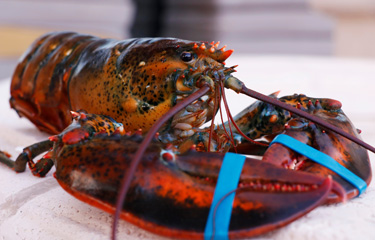New research completed in Atlantic Canada has found that North American lobsters may be able to cope with warming waters better than expected.
The research was presented at the 30th annual meeting of the Fishermen and Scientists Research Society, the CBC reported. According to the study, lobsters acclimated to warmer water are better able to tolerate higher temperatures than lobsters more used to cold water.
Researchers with the Centre for Marine Applied Research in Dartmouth, Nova Scotia, Canada performed the study by collecting 240 lobsters from six fishing areas around Nova Scotia and Prince Edward Island in 2022. Then, those lobsters were placed in a number of different water temperatures, from 5 degrees Celsius to 15 degrees Celsius.
The study found that lobsters kept in colder temperatures had a lower tolerance for high temperatures – a lobster kept in 5 degree Celsius water could only tolerate water up to 25.7 degrees Celsius but a lobster kept at 15 degrees Celsius could tolerate up to 29.6 degrees Celsius.
Centre for Marine Applied Research Scientist Ryan Horricks told the CBC that the information could indicate that if the rate of warming due to climate change in waters along the Atlantic coast of North America is slow enough, lobsters could adapt to the temperatures.
"In warming oceans, we're going to see sea surface temperatures and sea bottom temperatures increase over time due to the effects of climate change," he said. "So to me, this was a really encouraging study and an encouraging result because we found that lobster can in fact acclimate or change their thermal maximum to these warmer temperatures."
The study has not yet been published in peer reviewed journal. It was funded through CAD 121,000 (USD 88,000, EUR 81,800) from the Canada Department of Fisheries and Oceans’ Atlantic Fisheries Fund.
The research is of particular importance to lobster fisheries on the east coast of North America, in both Canada and the U.S. state of Maine, due to the rapid warming of the waters where lobsters are caught. Forecasts are showing warming waters in the Gulf of Maine as a consequence of climate change may result in lower catches.
Additional studies in the U.S. of how the warming waters and ocean changes will impact the lobster fishery – the most-valuable fishery in Maine – are ongoing.
Photo courtesy of Libin Jose/Shutterstock







